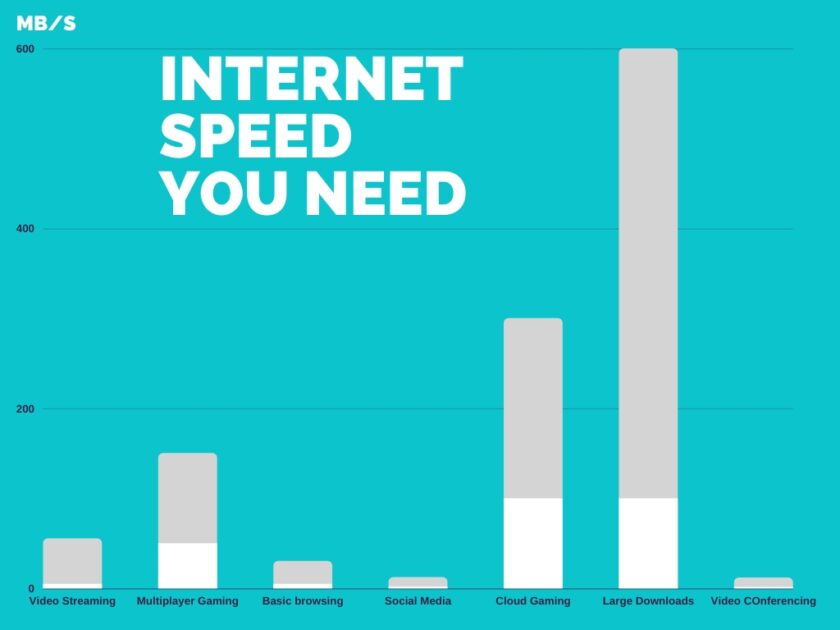The average internet speed in the US is 45 Mb/s. The ideal internet speed, however, depends on the user’s purpose. There are some activities asking for much faster speeds than others. In fact, small differences in speeds can significantly affect the user’s experience. On top of that, consistency of the speed is just as important. If the speed is 80 Mb/s for a second, and then drops to 10 Mb/s, it won’t be a pleasant experience. Such fluctuations are common in some cheaper connections, but premium connections, too, do not ensure consistent speeds. Choosing the right ISP is the first adequate step.
What Internet Speed Should I Have?
The chart below shows the internet speeds you need for different purposes:

- Video streaming – 5 to 50 Mb/s
- Multiplayer gaming – 50 to 150 Mb/s
- Basic browsing – 5 to 25 Mb/s
- Social Media – 2 to 10 Mb/s
- Cloud Gaming – 100 to 200 Mb/s
- Large Downloads – 100 to 500 Mb/s
- Video Conferencing – 1.5 to 10 Mb/s
Things to consider about internet connection
Invest in a good quality connection – Bad internet connections can have more latency, jitter, and packet loss. That’s due to a bad Internet Service Provider (ISP). It’s worth investing in a good quality connection with a reliable ISP. To find out what’s the best ISP in your area, use the comparison tool from Broadband Now.
Buy more speed than you need – It’s good to buy more speed than you currently need. That’s especially important if you download larger files. The actual downloading speed of files is often much lower than the maximum speed of your connection. In most cases, if you have a 100 Mb/s connection, files download at around 15-20 Mb/s.
Never settle for an unstable connection – An unstable connection is always worse than a slow connection. Immediately complain to your ISP if your connection is unstable.
Look for a reputable ISP – Some ISPs may give you a faster connection at the price of your privacy. For example, some ISPs sell user data to advertisers or even throttle certain types of traffic. To make sure your ISP is reputable, check reviews from other users, and look for any news stories about them.
Use a wired connection if possible – Wireless connections are often slower and less stable than wired connections. If you can, use a wired connection instead of a wireless one.
Check your equipment – In some cases, the problem may not be with your ISP. The problem may be with your equipment. For example, an old router may be the bottleneck of your connection. In that case, you should upgrade your router.
Why do websites load slowly despite a high internet speed?
Websites can load slowly for two reasons, and slow internet speed is only one of them. You may be thinking that you’ve paid for a higher internet speed, and it still takes an eternity for a web page to load! Even if you have a high internet speed, websites may open slowly due to their lack of optimization for speed. It’s nothing wrong on your end. According to tooltester, the average loading speed of a website is 2.5 seconds on desktop and whooping 8.6 seconds on mobile. You and many other consumers strictly hate slow-loading websites and complain about the ISP. In fact, even stats say: if a webpage loads for more than 3 seconds, 53% of mobile site visitors simply leave. Yes, it’s not just you! But still, before calling your ISP, do test your internet speed.
Ideal Internet Speed for your Budget
Your internet speed is the last thing you want to skimp on when setting your budget. Faster internet speed always seems attractive. It’s true that high-speed internet is essential for cloud/multiplayer gaming and large downloads. Furthermore, if many people in your home are streaming or gaming in 4K, you’ll need a higher speed. But it doesn’t mean you have to break the bank. According to Forbes, 25 Mbps internet costs $32 a month. However, a 1000 Mbps internet, despite being 40 times faster, costs a little more than double. Now, your decision here might look obvious – you may want to go for the 1000 Mbps one. That’s a big mistake because there is a reason for such a large difference in price. The majority of internet users simply don’t need more than 25 Mbps. In most cases, a consistent 25 Mbps does the job for you, unless:
- You’re a competitive gamer.
- You have multiple people streaming 4K content.
- You consistently need to download huge files.
Bottom Line
Internet speed is important, but it’s not the only thing that matters. Consider other factors such as latency, jitter, and packet loss. Also, make sure your equipment is up-to-date, and don’t look for faster internet by giving up your privacy. If you’re concerned about your privacy, use a VPN. That will encrypt your traffic and make it harder for your ISP to sell your data. It will cost a little bit of your internet speed, but it’s worth it. In fact, that’s the ideal way to go.
- AI-Powered PCs: Overhyped Trend or Emerging Reality? - August 21, 2024
- Princeton’s AI revolutionizes fusion reactor performance - August 7, 2024
- Large language models could revolutionize finance sector within two years - March 27, 2024



